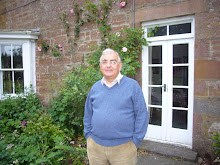CEILIDHS ARE a deeply ingrained part of Scotland's traditional culture but, like so many things, their character has largely changed from the what is sentimentally described as the genuine, couthy, fireside gatherings of times long past. Old men told tales, wives and mothers sang the working songs of the district and, as pipers piped, young warriors danced over two crossed swords in a display of victory. It was the way local culture cascaded down generations, the way youngsters learnt their culture at their elders' knees and, in turn, handed it on to succeeding generations.
As often as not, what are billed today as ceilidhs are stage managed affairs with little of the spontanaity that we associate with impromptu gatherings in smoke-filled blackhouses with the cattle in the byre at one end of the building. However the spirit of such parties most definitely lives on.
For the past four years kind friends have filled their house with like-minded souls for "a night with the grand". If they don't call the event a ceilidh, it surely meets most of the criteria. So successful has it become that the event now extends to two evenings of singing and recitation. Dancing is not possible as only those with the most urgent and pressing alternative arrangements would dream of turning down their invitation, and the house is bursting at the seams both nights.
My wife is resident pianist which means I get to go both evenings. It also means I have to have two party pieces but this has made me explore the songs and poetry of Scotland. My special love are the cornkisters and bothy ballads of the north east of Scotland and the work of poets like Violet Jacob, WD Cocker and Helen Cruickshank.
It has been surprising what a range of talents has emerged from these evenings. Fine singers, memories of childhood in poems learned in the nursery and recalled with surprising clarity - and, of course, a piper. What fun these evenings are, and how they draw people together. No one is shy about performing and if they hit a bum note or have to refer to a crib to remind them of the next line of a poem, nobody thinks anything of it, and applause is no less sincere.
Such evenings benefit from food and drink and our hosts are generous in the provision of both. In the spirit of community other wives help out with contributions of puddings and the like and the performing is interspersed with breaks to restore our strength for the next session.
Gilbert & Sullivan songs were popular this year. Fifty years ago their songs were regularly sung at all sorts of entertainment but, as is the way of things, they grew less fashionable and fell out of fashion. Gilbert was the librettist and wrote clever, witty songs which were so well complemented by composer Sullivan's tuneful music. Three of this years company company had been ill and we came together to sing "When you find you're a broken-down critter" from "The Grand Duke" which is probably the least well-known of G&S's operettas. Our performance was masterly and we finished with a flourish to wild acclamation and demands for no more!
Must go, going out for supper - more will follow.
Substack – My New Newsletter
5 weeks ago
